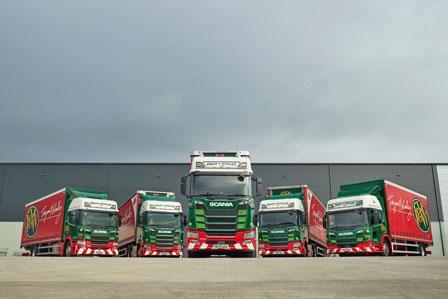
In February Lancashire family logistics company Fagan & Whalley (F&W) completed the acquisition of Alan R Jones & Sons, another long-standing family firm in Newport, South Wales. The establishment of a base in South Wales was just the latest in a series of investments the sixth generation haulier is making in the future of its business.
F&W was founded in 1927 with a single horse and cart, acquiring its first truck – a Model T – in 1928. It has made a series of moves and site expansions as the firm has grown and relocated to its current headquarters Albion House, a former call centre, on the Shuttleworth Mead Business Park in Padiham near Burnley in 2016.
The firm moved its original Hapton depot to a larger site in 1980 to make way for the M65 motorway, extending it in 1995. Its DC at Shuttleworth Mead on the site of a former power station was completed in 2001 and was expanded in 2006 with an additional 30,000sq ft of warehousing.
In 2017 it opened a new purpose-built 92,000sq ft warehouse at nearby Burnley Bridge and in 2021 the firm acquired another site at Frontier Park, Blackburn, providing an additional 126,000sq ft of warehousing and an 86,000sq ft cross dock facility which relieved the pressure on Shuttleworth Mead.

Sam Fagan, Fagan & Whalley business strategy director, pictured left, says that the firm took on Frontier Park last February and it will soon be full.
“It went operational in October 2021 and by Easter 2022 it was full,” he says. “We need to increase the cross dock side of the business to fill it so we will need more vehicles on the road to do that.
“We had no option as we were completely saturated here at Shuttleworth Mead.”
Warehousing growth
Fagan attributes at least part of the growth in demand for warehousing to Brexit, as some UK manufacturers are looking to repatriate production and need additional storage and distribution capacity.
Despite the rapid growth in warehousing, operations strategy director Daniel Wood says F&W will remain focused on the road transport side of the business.
“The bulk of the business will always be transport,” he says. “We are trying to find the synergies because a lot of customers want warehousing and we can provide distribution for them. It is that one-stop-shop they look for, to the point where we also collect containers from Liverpool on our own vehicles, de-stuff them, store the product and then do the distribution in the North West.
“We have a lot of customers who operate out of an office and we do everything for them.”
Haulage in the blood
Fagan adds: “Haulage and trucks will always be in our blood. That’s who we are and that’s what our history is all about. But we have to diversify and keep up with the times. Warehousing and logistics services is where the world is going so we have to provide that service. It works.
“We probably wouldn’t be interested in a job that was purely storage. It has to have something on the back of our vehicles and that is the service we sell.”
The rise and rise of internet shopping does however mean there is growing demand for small scale pallet storage with low volume home delivery, but this is not a market F&W wants to get involved with.
“We undertook a full review of our customer base last year,” says Wood. “We found that 95% of our work was coming from the same number of customer as the remaining 5%. So we had to stop being all things to all people and move away from customers who were only giving us three pallets a week.”
Fagan goes on: “When we opened Burnley Bridge five years ago we were desperate to fill it. That was a huge step for us into warehousing and we took some customers on who would only store 20 pallets with us and pick one case
every couple of days.
“We have to draw the line somewhere because there are companies who provide that kind of service but it didn’t work for us. But we also appreciate that some of our big customers started like that so we have to take a fair view of what works and what doesn’t.
“We want to develop relationships with customers, not just be a bulk storage arm.”
As all its warehouses are BRC accredited F&W is keen to attract food and packaging manufacturers and distributors as customers. The customer whose containers it handles imports dried fruit, for example.
Palletforce founder
F&W is a founder member of Palletforce and, along with most of the pallet sector, it had a very busy pandemic.

“After the first lockdown in 2020 lifted volumes went supernova,” says Wood, pictured right. “Combined with the driver shortage it was very difficult. We had to review driver wages three times last year so customer rates also had to be reviewed three times.
“It got to the point where efficiencies went out of the window with far too much empty running just to keep pace with demand. We have learned lessons from that as we regroup now that things have calmed down.”
F&W usually has more volume inbound than outbound to Palletforce’s Burton hub and while Wood says the firm “couldn’t work without it” the directors are focused on developing the groupage operation. “Palletforce complements our own groupage operation excellently,” he explains. “In our cross dock operation we can build between 25 and 35 loads a night as well as running our eight trunks into the network. We handle around 1,500 pallets a day in total.”
Dedicated demand
Larger customers like the idea of their consignments being delivered direct by F&W rather than going into a network, as there is less handling and so less chance of damage with a single cross dock rather than being touched up to nine times in a network operation.
“There is still a demand for dedicated rigids from customers delivering such things as air conditioning ducting to building sites or bulk kerb side deliveries to shops or cash and carries,” says Wood. “We find we can do a multi-drop run around Yorkshire on an 18-tonner with six drops on and it pays very well. I am phasing out the 7.5-tonners and replacing them with 12-tonners as the payload is far superior and most drivers now need a Class 2 anyway.”
Palletforce has a limit of 1,000kg on pallets for tail lift delivery, which F&W abides by, though Wood says it should be lower across the industry. “We are actively pushing for 750kg maximum,” he says. “We reluctantly accept 1,000kg but we have changed our tail lift spec. We traditionally used foldaways but we have gone to 1,500kg cantilevers.”
Drivers are also provided with powered pump trucks, essential kit with the boom in palletised home deliveries during the pandemic. “Our biggest pallet customer does DIY bathrooms,” says Wood. “Someone can order a bathroom and have it delivered before 10am the next day. That saw massive volumes in lockdown as people were doing DIY home improvements.”
The firm has invested heavily in driver training for pallet deliveries and empowers drivers to refuse a delivery if they do not think it is safe. “The message is ‘if there is any doubt, stop’,” says Wood. “It is not deliver at all cost.”
Driver merry-go-round
F&W did not suffer too badly from Brexit as it only employed a handful of Eastern Europeans among its 200 drivers, but the UK-wide shortage has seen a “merry-go-round” of drivers moving jobs “for pence”.
“After they left most wanted to come back very quickly,” says Wood. “We pay a very competitive rate and that has stopped the haemorrhaging of drivers. We don’t use agency and all our staff are employed. That sometimes means we have far too much kit parked up but it is the decision we have made. It is a day’s induction before anyone gets near a truck – we don’t do much point-to-point and there is so much groupage and multi-drop work that we have always tried to keep it inhouse.”
Wood says that F&W has run apprenticeships to bring in new drivers but did not find the course structure “fit for purpose”. So it launched its own scheme, Future-bound, that brings in new recruits with a car licence and trains them up to be HGV drivers.
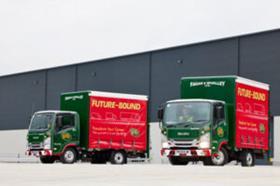
“We are trying to attract van drivers and have acquired two Isuzu Grafters with forward controls, curtainsided body and a tail lift so it is like a small truck but 3.5 tonnes,” says Wood. “We start them out on that so they learn to work a tail lift, curtains and ratchet straps.
“If they are successful they start on their Class 2 training and go onto 12- and 18-tonners before going onto Class 1.”
Total staff before the Alan R Jones acquisition was around 340 and the fleet comprised of 170 trucks, mainly Scania tractors, and a handful of DAFs, mainly 12- and 18- tonne LFs. It has just taken on its first batch of DAF New Generation XF tractors, mainly because they were readily available.
“We were offered them so we took them,” says Wood. “With the supply problems last year we had five months where we could not get new vehicles so when DAF offered us a deal we took it. Scania won’t open their order book now until 2023 and we always plan on buying two tractor units a month as fleet replacements.”
Scania fan
F&W became the first UK operator to run the full range of Scania trucks last year when it took its first L-cab on trial to add to the P- and G-cab rigids and tractor units used on both local, distance and double shifting operations, over 50 R-cabs, and a few S-cabs, usually awarded to the longest-serving drivers.
“The first S-cab was purchased back in 2017 as part of our 90th anniversary celebrations and named Doris, after the mother of two of our owners,” says Wood. “The Scania R-cab is our standard long-distance fleet vehicle, and we’ve found that it remains the best vehicle available for general operations.”
As a general haulier, any F&W truck could go into London at any time so speccing vehicles with a three-star Direct Vision Standard rating ready for the 2024 tightening of the DVS rules will be key to future purchasing decisions.
Driver appeal is also an issue, so despite performing well on fuel consumption a batch of Mercedes-Benz Actros tractors will not be retained on the fleet.
“The fleet engineer loves them but there has been a shift in driver preference and we struggle to find drivers for them,” says Wood. “Everybody wants a Scania and we have such a fantastic relationship with Preston Scania. You pay for it but it is the best truck on the road.”
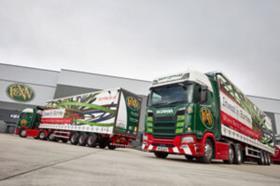
The Scania’s legendary longevity is also a factor, and after four years on the fleet they prove to be in much better shape than the Actros.
“We purchase and maintain all our trucks and run them to the end of their life,” says Wood. “That is about eight years. The distance vehicles cycle down to day work after about five years. But we were finding drivers last year coming in and saying ‘I’m not driving that five-year-old truck’ so we are looking at replacing them after five years now.
“We have also looked at contract hire but we like the control and feeling of ownership so we can decide when that vehicle is moved on.”
Buying policy under review
The image of the fleet is also very important to the directors – all the trucks are painted at a local body shop rather than being vinyl wrapped. “We tried it,” says Fagan. “But we didn’t like it.”
The policy of outright purchase is under review as the need to invest in expensive alternative low carbon fuelled trucks looms on the horizon. “We have to be open to all options as this world rapidly changes,” says Fagan.
Wood goes on: “We are looking at that and talking to Scania. From my research hydrogen will be the way forward but we are still nowhere near that. The government is very optimistic with its end date for diesel vehicles [2035 for trucks under 26 tonnes and 2040 for bigger vehicles] and I think that will have to change.”
F&W looked at buying a couple of MAN electric 3.5-tonne vans for its Future-bound drivers but the limitations on payload imposed by the batteries made them impractical, according to Fagan.
“Electric would be ideal for us operationally but putting batteries on means you don’t get much weight on the van,” he says. “The cost also meant it just did not stack up. We are ready for them but it has got to be right for a commercial operation.”
When it comes to trailers F&W traditionally bought Lawrence David but since the 50-year-old manufacturer was acquired by Polish firm Wielton in 2018 Wood says product quality and service have suffered.
“So we looked at SDC but didn’t get a much better response,” he says. “Our supplier at the moment is Dennison and we are getting a much better feel – they are a family firm like us and we are dealing direct with James Dennison. The driver feedback is also excellent.”
The firm operates a handful of fixed-deck doubledeck longer semi-trailers for the Palletforce trunks but Wood says “we haven’t found a need for LSTs on anything else as yet”. Fagan also has concerns about the longevity of these large trailers and says F&W won’t be buying any more LSTs.
Alan R Jones investment
The Alan R Jones acquisition added 39 trucks, 65 staff, 40,000sq ft of warehousing across two sites and a distribution depot in Newport, South Wales. F&W will be investing in new vehicles for Alan R Jones to bring its ageing mainly Renault fleet up to Euro-6. The Welsh haulier is also a member of Palletline, something that F&W intends to maintain, and runs powder tanks of which F&W has no previous experience.
“It was all part of the strategic plan we have to grow the business,” says Wood. “We have had a presence in South Wales for 15 years and have a joint venture company with Farrall’s Group in Chester to handle the insulation distribution contract with Knauf.
“We had 10 vehicles based in South Wales and it has been a strong area for us so we were actively looking there. Our operation in Cwmbran is based in a customer’s premises and we already run three or four full loads and two or three groupage loads into South Wales and the South West every day, so Alan R Jones will now provide fuelling, workshops and washing facilities for us.
“We have a depot in Coventry with around 25 units based there and are also looking in the East of England to create a triangle covering England and Wales. Fewer drivers want to be having nights away, so we want to create a network where the travelling distance means we can trunk from here overnight in a shift and exchange freight between depots. That makes us less reliant on distance drivers as the local feeders can reach anywhere in a day shift.”
Looking East
The company business plan for a number of years has been to develop this network of regional depots, including in the East and South East of England.
“A lot of it was fuelled by the DVS requirements in London,” says Fagan. “The ULEZ isn’t a major concern to us because we have a very modern fleet but we have 10 to 20 vehicles a day going into the DVS zone and so we started to look for a regional depot north of the M25 within trunking distance of Lancashire.
“The gut feel within the business is that Huntingdon, Cambridge and that kind of area is the right place for us.”
Wood adds: “We have a lot of freight going into East Anglia and it is no secret we are looking for an acquisition in that area.”
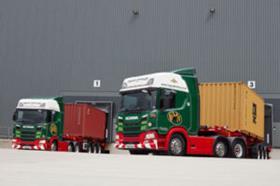
F&W prefers acquisition to setting up from scratch because of the “sky high” cost of land in the target area. “We would like a ready-made bolt-on – provided it is the right fit,” says Wood. “We wouldn’t just buy anyone.”
It has no plans to expand north of Lancashire, however, and has good relationships with Scottish hauliers including WH Malcolm and a much smaller firm, Reive & Grossart, like F&W a member of Palletforce and the Transport Association, based in South Lanarkshire.
“We have worked with them for a long time,” says Wood. “They have around 12 trucks and we exchange freight with them and park on their premises. We are good friends and they are our northern branch!”
F&W used to run to the continent but withdrew from international work before the UK pulled out of the EU, partly because of Brexit but also due to the worsening stowaway situation. “We have enough work in the UK so it wasn’t worth bothering with,” says Wood. “Any European work we get now we sub-contract.”
A match based on family values
A key part in the successful takeover of Alan R Jones was the similar family values held by both firms. Alan R Jones will continue to run as a standalone business and there are no plans to phase out the name which dates back to 1971 – though there may be an element of dual branding in future.
Sam Fagan says: “We’re extremely proud to be welcoming the Alan R Jones team on board and to be acquiring the brand as part of the Fagan & Whalley family. Alan R Jones & Sons is a business that, having been built up from an initially small operation just like ours was, holds similar core values and celebrates an excellent reputation in Wales and across the South West.”
Ray Clegg, former MD of Alan R Jones & Sons, says: “It had become an obvious strategic move for the business to look at new opportunities, and when we had a discussion with the team at Fagan & Whalley, it was immediately clear that they put their people at the core of what they do, with a reputation that’s second to none, and I am truly delighted that Alan R Jones & Sons will now move forward into the future with new leadership and new opportunities.”
The Jones family sold the firm to a management buy-out in 2018 and the three shareholder directors felt now was the right time to move the firm on. Two of the three will be retained within the business while Clegg will work as a consultant.
“There were a lot of opportunities and they wanted someone to push those on,” says Fagan.
F&W was founded in 1927 by Thomas Whalley and his son-in-law Sam Fagan but after a few years the Whalley family withdrew from the business and for a while it was known as Fagan’s Transport.
But subsequently it was decided to bring back the Fagan & Whalley name and revert to the mainly green livery after a spell with the trucks painted grey.
Sam is the son of Stephen Fagan who, along with his brother Graham, are joint CEOs and owners of the business.
To strengthen the management, last year the board was expanded from two to six directors with the appointment of Sam Fagan, Daniel Fagan (transport operations director and Graham’s son), Graham Clare (business development director) and Daniel Wood.
Wood describes himself as an “adopted” member of the Fagan family, having been with the firm 21 years. “Trucks are all I’ve known and loved, and I always wanted to work in the industry but not as a driver,” he says. “After high school I picked out a degree course in transport management and planning at Loughborough and then joined the graduate management scheme at a firm called Holden in Blackburn. I had decided I didn’t want to work for a big company but they were bought out by WH Malcolm so I went to a furniture carrier in Chorley before coming here at the age of 24.”
Sam Fagan says that while some board members may not be family members by name Wood has been with the firm over 20 years and Clare 15 years. “They are as much family as anybody,” he says. “My sister and my cousin
Dan’s sister also work in the business so we have a succession plan and a great future. There is lots of ambition and energy, but we want to do things right – that’s the key.”
Keeping control within the family
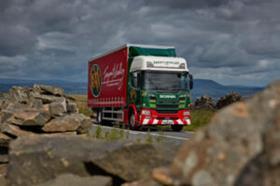
As a family-owned firm, F&W self-funds its investments in assets, owning its land and vehicles outright.
“We do have a very friendly bank manager but we own our property, so we are able to borrow on that,” says Sam Fagan. “Blackburn is leased, the first ever lease we have entered into, but at the time we didn’t have time to build something. The business was growing so fast at the other sites and there was nothing available to buy.
“We wanted to keep to the same style and standard as our flagship distribution site at Burnley Bridge so Frontier Park wasn’t ideal and we had to bend our internal rules a little to make it work. It is a distribution centre and there isn’t a lot of yard space or vehicle parking.
“There is no wash bay so it isn’t a transport depot as we know it but it works from a capacity point of view.
“The Alan R Jones acquisition was a mix of funding and self-financing.”
In the year to 30 April 2021, while turnover grew by just 2.5%, F&W’s pre-tax profit almost quadrupled to £1.5m.
“2021 was an exceptional year for our industry, not necessarily from a volume point of view but we saw profits you wouldn’t normally see in transport,” says Fagan. “Fuel was the right price and volumes were just right for maximum efficiency. I would say this January and February has been a return to normal. Profitability is naturally lower in the first quarter and we are now back to 2019 levels. It has been a normal start to the year.”
With the family being so hands-on and hard-working Wood says the directors are not in it for the money.
“Graham and Stephen don’t have a yacht somewhere,” he says. “Everything is reinvested and that is how we have grown.”













